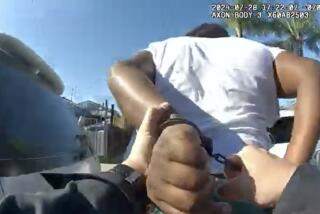CHP Officer Weeps as She Recounts Beating : King trial: Called to tell of high-speed chase, defense witness breaks down while describing baton blows. Powell’s lawyer says her testimony is ‘damaging,’ but ‘not ultimately believable.’
- Share via
A California Highway Patrol officer cried on the witness stand Friday as she described the beating and arrest of Rodney G. King, saying she was shocked by repeated baton blows to King’s head.
The officer, Melanie Singer, was called to the stand by a defense lawyer in order to testify about the high-speed chase that led to the beating, as well as King’s erratic behavior when he got out of his car. She made those points and a few others helpful to the officers, but the defense paid a heavy price when she delivered a wrenching description of the beating.
Under questioning from Michael P. Stone, the lawyer for Officer Laurence M. Powell, the CHP officer said she saw King convulse and fall to the ground after Sgt. Stacey C. Koon activated an electrical device known as a Taser.
“As soon as he fell and caught himself,” Singer said, pausing as tears welled up in her eyes and her voice cracked, “Officer Powell came up to the right side of the driver with his baton out, and he struck the right side of the driver’s face.”
Singer was a prosecution witness during last year’s state trial of the same four officers now accused of violating King’s civil rights during the March 3, 1991, incident. Powell, Timothy E. Wind and Theodore J. Briseno are charged with kicking, stomping or striking King with batons, thereby depriving him of his constitutional right to be safe from the intentional use of unreasonable force.
Koon, the senior officer at the scene, is accused of allowing officers under his supervision to administer an unreasonable beating. If convicted, all four defendants face up to 10 years in prison and fines of as much as $250,000 each.
In her testimony, Singer described Powell circling King, who was on his knees, and striking him six times in the head with his baton. One blow split King’s cheek from the ear to the chin, she said, although photographs of King’s injuries do not reveal a cut of that size.
As Singer gave her account of the beating, she demonstrated the blows on Stone, who knelt in front of the jury box. Jurors stood and peered down as Singer wielded the baton on Stone, holding it next to his cheek and head to show where the blows landed.
“You were shocked by what you saw, weren’t you?” asked Stone, apparently in an attempt to reinforce his point that the violence of the event had altered her memory.
“I still am,” she said, sniffling through her tears.
“That’s why you broke down and cried,” Stone said.
“Yes, sir,” Singer responded. “I’m human.”
As Singer testified, Briseno held his face in his hands. Even though Singer told jurors that she saw Briseno block one of Powell’s baton blows, Briseno’s lawyer, Harland W. Braun, said later that he was mystified by the decision to call Singer as a defense witness.
“I don’t understand it at all,” Braun said. “Even I cannot put a spin control on this.”
Ira Salzman, who represents Koon, also had a hard time explaining how Singer’s testimony could help the defendants.
“I can certainly see why a reasonable person would be confused,” the normally upbeat Salzman said outside court.
Stone insisted that Singer’s testimony had established several important points for the defense. He said her description of the blows is not borne out by the videotape.
“It’s damaging,” Stone said of the emotion she displayed on the witness stand. “But it’s not ultimately believable.”
Singer’s testimony contains several points that are inconsistent with the videotape and with other witnesses’ accounts.
At one point, Singer said she recalled hearing officers radio for an ambulance while King was lying, hogtied, by the side of the road. On the videotape, however, it appears that Powell made that radio call just moments after the beating concluded, before officers had moved King.
Singer’s description of the blows to King’s head is difficult to confirm or dispute. She said that all six baton strikes were delivered during the opening moments of the videotape, when the tape is too blurry to clearly tell where the blows are landing.
But four of the six blows that Singer described were to the left side of King’s head, and no medical evidence has suggested that King suffered a serious injury there.
The inconsistencies in Singer’s testimony were widely discussed after her appearance during the state trial, and many legal analysts have said they believe it was those inconsistencies that led federal prosecutors not to call her.
Stone said he believes jurors will therefore disregard that testimony and will focus on Singer’s description of the chase and of King’s behavior at the scene. Among other things, Singer said King resisted police officers and that when he finally fell to his knees, he crawled on the ground “parading around like a dog.”
Braun said he hoped that Stone is right about what jurors will retain from Singer’s testimony. But he expressed some doubts.
“The basic rule is that you don’t call a witness just to discredit her,” Braun said. “I have no idea why he (Stone) did this.”
Singer will return to the stand Monday to face cross-examination by prosecutors. Stone is then expected to call another former prosecution witness, Bryant Allen, who was one of King’s passengers on the night of the incident.
More to Read
Sign up for Essential California
The most important California stories and recommendations in your inbox every morning.
You may occasionally receive promotional content from the Los Angeles Times.














